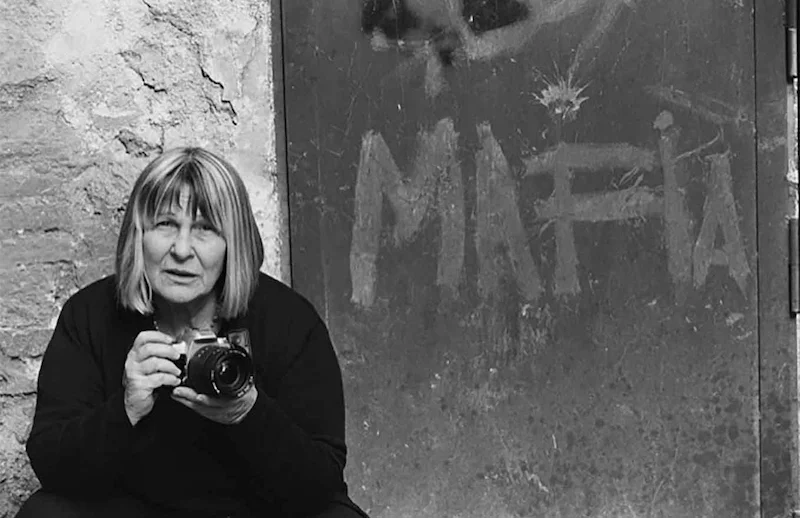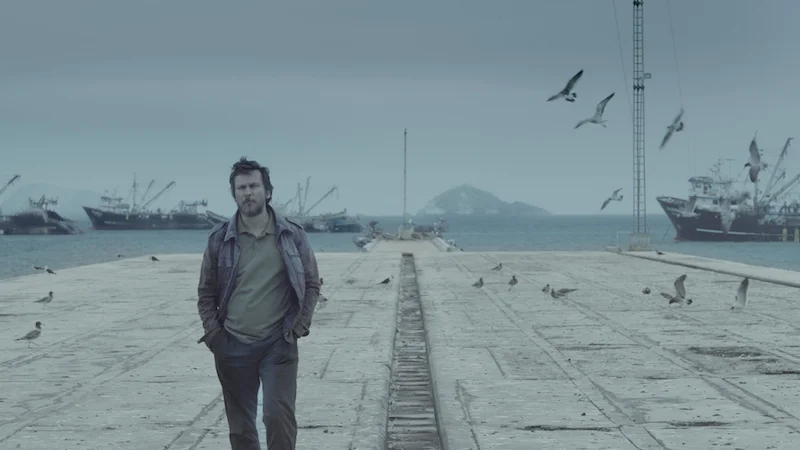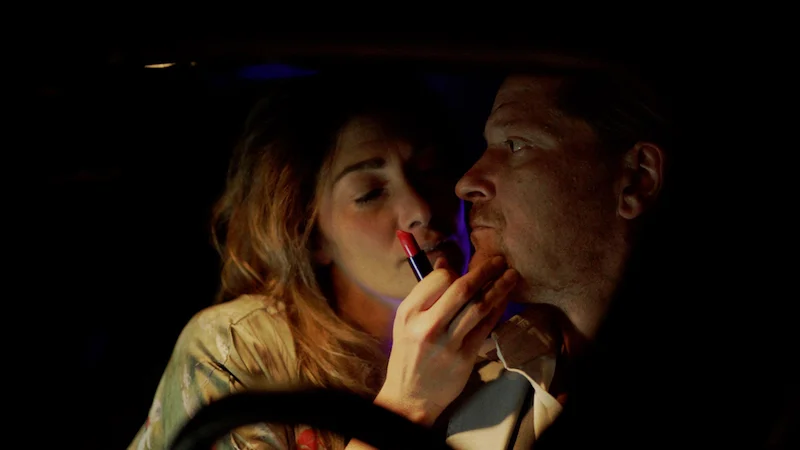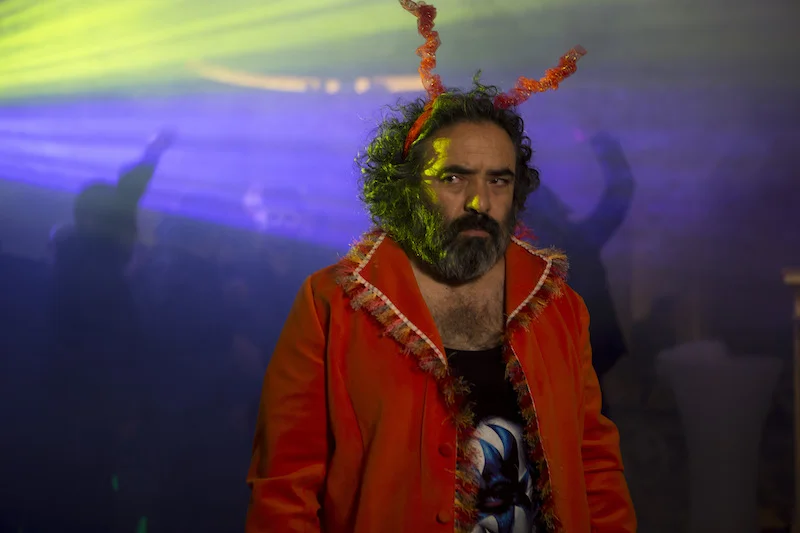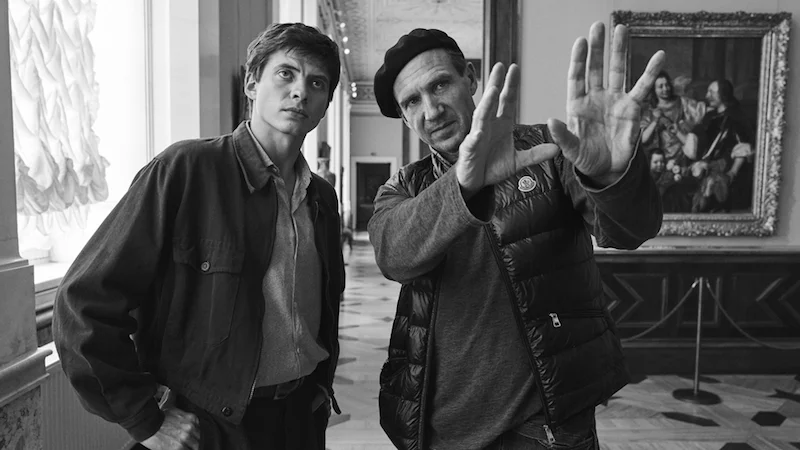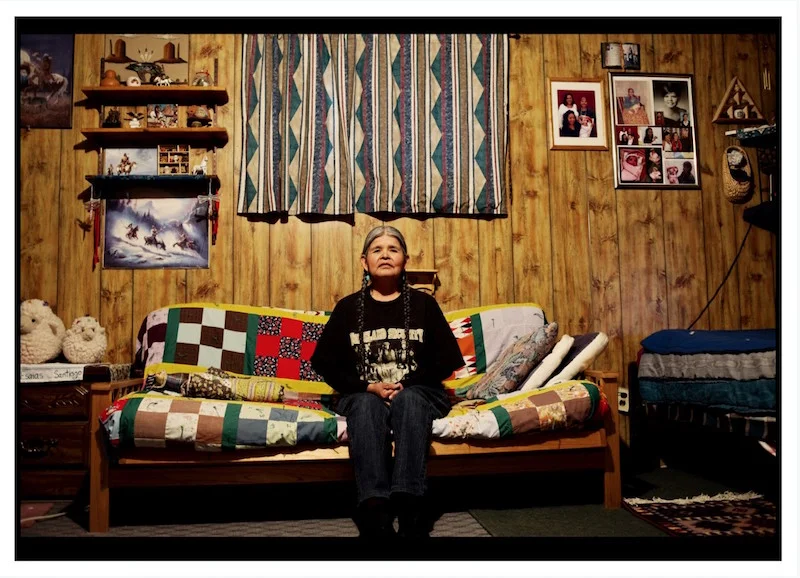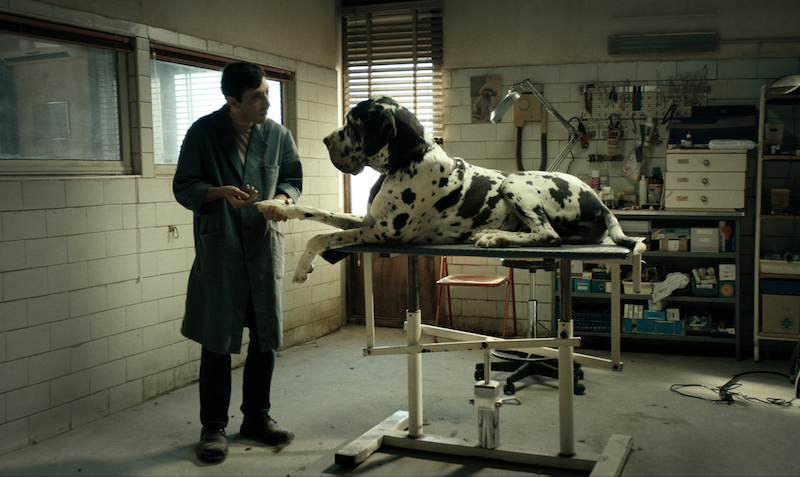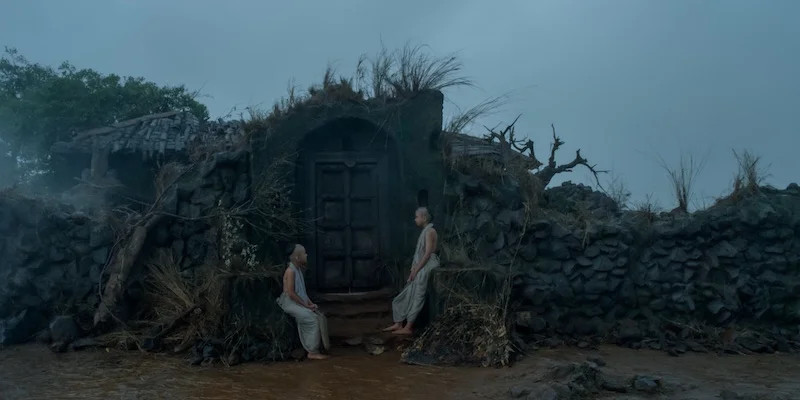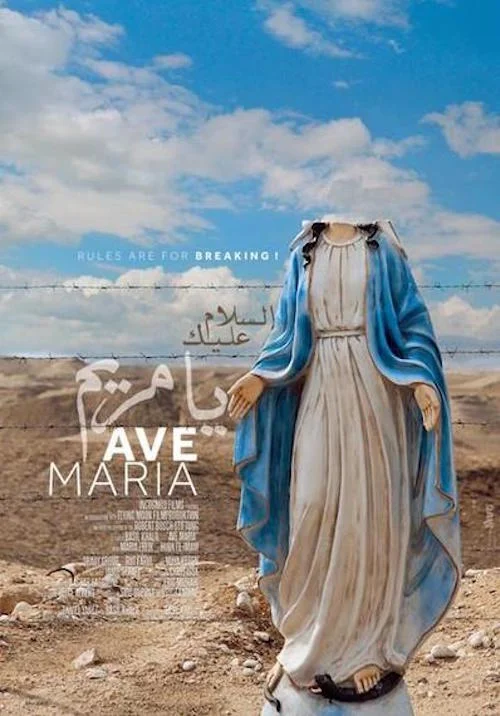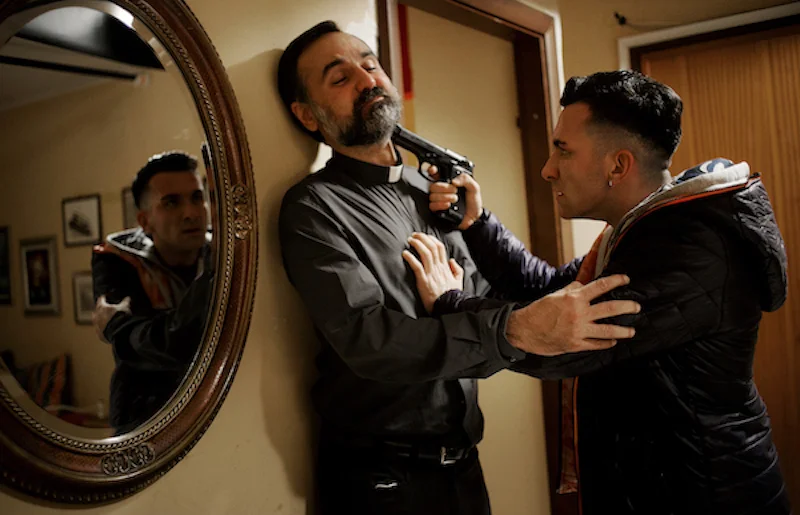Letizia Battaglia, her last name not incidentally means “battle,” has been a one-woman army fighting that decline. Through her photographs of the Mafia and the destruction it caused in her home city of Palermo — courageous because each one could have meant her death by execution, if only for having captured the soul of the unworthy, or the wrong moment in time — Battaglia has shown the world what courage, resilience and being Italian really does mean, at its highest form.
Read More'Todos Somos Marineros' at IFFR: Addressing our global displacement with Peruvian filmmaker Miguel Angel Moulet
It’s a fact that there has never been such a movement of global general uprooting, in the history of our planet. Most of us feel deep inside ourselves a sense of dissatisfaction and the easiest way to deal with it seems to be to pick up and leave -- for work, love or life experience. But that can also turn into the most difficult decision of our life, because sometimes you cannot go home again.
As an old friend used to remind me, in moments when even traveling to the other end of the planet hadn’t really fulfilled its purpose, “Nina, the problem is that when you travel, no matter where you go, you’ll always take yourself along.” It’s so true, our inner struggles transfer well, hidden within the deep recesses of our beings. And even the furthest journey sees us as our sometimes unfortunate travel companion.
Miguel Angel Moulet’s haunting, sultry and perfectly shot film ‘Todos Somos Marineros’ (‘We Are All Sailors’) tackles that idea, but also mixes in several other themes, including the rhythm of language and how we change depending on the words we speak, as well as the filmmaker’s own unresolved childhood family mysteries.
Read More'The Image Book' at IFFR: Watching cinema as God(ard) intended it
I’d read the reviews, both out of Cannes where the film premiered, and lately for its US release. A.O. Scott’s was my favorite for the NY Times, as it usually is. Then, I’d listened to friends — some admitted to breaking down after viewing the film, some pointed to the filmmaker’s problematic mishmosh of the Arab world with Iranian images.
But having missed ‘Le livre d’image’ (‘The Image Book’) at the Festival de Cannes, I had to view it for myself. And, it turns out, I did well to wait.
Read MoreEmilia Derou Bernal and Julien Debard in a still from Anaïs Volpe’s ‘Indemnes’
Anaïs Volpé's 'Indemnes' reinvents the palette of tragedy at the International Film Festival Rotterdam
How do you personally survive tragedy, when it hits close to home?
It’s a question that has played in my mind over and over in the last few months. Each of us has a distinct and very human way of dealing with personal tragedy, and none of it is wrong or right, I’ve figured out. It just is.
Filmmaker Anaïs Volpé says that her way of coping with terrorist attacks, which have hit very close to home, literally for the Parisian, is to turn blood into glitter and imagine that the victims have gone to a better place. We hear that time and time again, “they have gone to a better place now,” but in Volpé’s exquisite ‘Indemnes’ (which translates to “Unharmed”) that better place is filled with color, beauty, peace and harmony. It’s a beautiful view into the afterlife, complete with stylish golden jackets, from an artist who has had her own creative style from the get-go.
Read MoreThe Trieste Film Festival turns 30 this year and in this edition teaches us the trouble with walls
The Italian city of Trieste has always had its own particular history. From its Austro-Hungarian and Slovenian influences, to its proximity to the Croatian border, its people have enjoyed a special status. At the end of the 19th Century, Trieste had more Slovenian inhabitants than Slovenia's capital of Ljubljana and at the start of the 20th, great luminaries and intellectuals like James Joyce, Italo Svevo, Sigmund Freud, Zofka Kveder, Dragotin Kette, Ivan Cankar, Scipio Slataper, and Umberto Saba frequented the bustling cosmopolitan city.
To me, it has always been a city with a foot deeply planted in its Italian roots yet the other striding towards its Eastern European culture. A bridge city overlooking a port, filled with people of different ethnicities and speaking several languages and dialects. A utopia for the perfect world, a place where everyone truly, and mostly could get along. And have gotten along.
We have so much to learn from the city of Trieste these days.
Read MoreHasan Majuni in a still from Mani Haghighi’s ‘Pig’
"So I thought, I’ll make a film about this cry-baby man": Mani Haghighi talks about his latest film 'Pig'
It’s interesting that in the same year, two prominent Iranian filmmakers made films where the idea came from the perils of social media. Of course, Jafar Panahi got the inspiration for ‘3 Faces’ from the myriad of fans who send him messages wanting to connect somehow with his talent and rotate in the moons of his celebrity-dom. Mani Haghighi instead with his ‘Pig’ found the humor within the stalking of sorts that happens on the feeds of Twitter and Instagram. And how these days we’ll do just about anything to be famous.
Of course, these two filmmakers are as different as filmmakers can be, yet their latest oeuvres are both featured in the upcoming Iranian Film Festival New York, which will run from January 10th to the 15th at the IFC Center. An event not to be missed.
Read MoreBehnaz Jafari and Jafar Panahi in a still from ‘3 Faces’
Three women on '3 Faces': Jafar Panahi's latest oeuvre at the inaugural Iranian Film Festival NY
Filmmaker Jafar Panahi has been banned by the Iranian government from making movies, for an unbelievably long while. Yet he continues undeterred in churning out one masterpiece after another. All shot in different locations, each time featuring a new cast of characters, Panahi’s films have continued undisturbed to be staples at international film festivals.
Those of us who know and love his distinct brand of filmmaking, where within his kind and well thought out delivery he still manages to packs a big punch, also follow him on social media. His Instagram alone is a pleasure for those who wish to witness a bit of his genius on a nearly daily basis. And in fact, it was his presence on social media that inspired his latest work — ‘3 Faces’. The film premiered in Cannes earlier this year and will be featured at the 1st Iranian Film Festival New York at the IFC Center in early January 2019.
Read MoreNanni Moretti's 'Santiago, Italia': Even as a documentary filmmaker, Moretti overwhelms with his vision
I’ll admit straight away, I’m partial to Nanni Moretti’s art. I adore his style and his films have inspired various stages of my life. In fact, I find myself reconnected to my Italian roots so deeply thanks to him.
But I did go to watch his latest, the documentary ‘Santiago, Italia’ with a grain of skepticism. I mean, Moretti proved he’s capable of making a kind of documentary many years ago, in 1998 to be exact, with the reality based ‘Aprile’. But could he hold my interest for 80 minutes with an archival film based about the coup in Chile, the original horrors of a September 11th which came long before our US one, and left their fairly elected president dead, with many other tortured and missing?
Read MoreRalph Fiennes directs Oleg Ivenko during the filming of ‘The White Crow’
Perfection: Ralph Fiennes' 'The White Crow' at the Cairo Film Fest
Rudolf Nureyev must be the most selfish man who ever lived!
That statement came from a woman in the audience, at the “In Conversation with Ralph Fiennes” that I was fortunate enough to moderate during this year’s Cairo International Film Festival. It was followed by a question about Fiennes’ latest directorial project, ‘The White Crow’, a moving, elegant film about Russian dancer extraordinaire Rudolf Nureyev’s defection to the West — and the events leading up to it.
But the question itself didn’t leave with me as lasting an impression as her statement, probably because in the very moment the woman uttered the above words, I stopped listening. I was too busy working out deep inside me why I hadn’t felt that way at all about Nureyev, and his decision depicted in the film. In the following days, I’ve worked out the answer. It’s a response I’ve probably been leading up to my entire life and career.
Read MoreJean Whitehorse in a still from Lorna Tucker’s ‘Amá’
Real American Heroines: Lorna Tucker’s ‘Amá’ kicks off the Global Health Film Festival 2018 in London
When I spoke to Italian filmmaker Roberto Minervini in Venice, I asked why he’d made ‘What You Gonna Do When the World’s On Fire?’ His answer still haunts me today, “one of the biggest reasons I made this film is that I realized that progressive America to which I belong, has accepted a level, a threshold of tolerance which includes inequality.” Minervini then added, as a mantra that now accompanies my own daily mundane struggles as a woman “there is no more fight for equality, lesser inequality has become the new equality.” We as a society tolerate, we no longer wholeheartedly accept or deny. And we seem to be OK with tolerating a lot of human beings.
In introducing Lorna Tucker’s latest documentary ‘Amá’ I feel like I must mention my fellow Italian Minervini, because I, like him and Tucker, wear a different pair of glasses when I look at American society today. I see America through the lenses of a first generation immigrant. I don’t see Trump as the new evil, but simply a reincarnation of all that is considered to be as “American as apple pie” — institutionalized racism and the persecution of people who are different and who have the courage to remain different.
Read MoreMarcello Fonte in Matteo Garrone’s ‘Dogman’, photo by Greta De Lazzaris
London Film Festival is all going to the Italians... Italian filmmakers that is!
Back in February during Berlinale, at the very start of this strange yet fateful year, I watched Laura Bispoli’s ‘Daughter of Mine’ and fell back in love with Italian cinema. I was then satisfied further in Cannes, where I got to watch three more fantastic Italian films — which included Matteo Garrone’s ‘Dogman’ and Alice Rohrwacher’s ‘Happy as Lazzaro’. Then Venice rolled around and there was ‘What You Gonna Do When the World’s on Fire?’ by Roberto Minervini and my personal, patriotic soul burst with pride.
Well, London audiences will soon be able to experience all of these titles in one place along with a selection that will include Laura Luchetti’s ‘Twin Flower’, Luca Guadagnino’s ‘Suspiria’ and Eduardo De Angelis’ ‘The Vice of Hope’. They are all part of the BFI’s London Film Festival Italian selection of cinematic picks from our peninsula.
Read MoreCarlos Acosta, photo by © Denise Guerra
Iciar Bollain's 'Yuli' offers a human, truthful journey through the heart and soul of a true artist
The most haunting aspect of Iciar Bollain’s ‘Yuli’ is how the filmmaker finally places in front of us the question most artists struggle with: Should you live your life doing what you are meant to do, or should you choose to live your life doing what you wish to do?
It’s a question as old as life itself and to me, the commonplace description “struggling artist” never really meant the financial struggles faced by most young artists, rather the struggle those who create, anything, and everything must feel inside. When it’s a beautiful day outside, the artist is usually inside, practicing his or her craft. When it comes time to form a family, or a simple life around themselves, they must own up to the art first. While most looking in from the outside see only the acclaim and bed of roses, the thorns of being an artist are much more plentiful and painful.
Read More“A collector of contradictions”: Amos Gitai takes us on a voyage of thinking with ‘A Tramway in Jerusalem’
“And despite the clamors and the violence, we tried to preserve in our hearts the memory of a happy sea, of a remembered hill, the smile of a beloved face.” — Albert Camus from ‘Resistance, Rebellion and Death: Essays’
As I watched Amos Gitai’s latest ‘A Tramway in Jerusalem’ with the usual anticipation I dedicate to all the works of the visionary Israeli filmmaker, I looked for the funny. After all, Gitai himself, in his director’s notes called Tramway “an optimistic and ironic metaphor of the divided city of Jerusalem”. In the synopsis of the film, the word “comedy” is used yet when I watched ‘A Tramway in Jerusalem’, more than once, I cried. Long, perfectly needed tears. The film world premiered out of competition at this year’s Venice International Film Festival.
Read MoreA still from 'Tumbbad' by Rahi Anil Barve and Adesh Prasad
Scary to the core: a teaser of 'Tumbbad' by Rahi Anil Barve and Adesh Prasad
Probably one of the most anticipated titles in Venice -- along with Luca Guadagnino's remake of Dario Argento's 'Suspiria' also a horror film -- is the opening work at the Venice International Film Critics Week, a cool sidebar of first features and shorts curated by film journalist Giona A. Nazzaro. 'Tumbbad' is a collaboration between two filmmakers from India, Rahi Anil Barve and Adesh Prasad and the synopsis alone gave me shivers…
Read MoreFrom left, Angela Fontana, Blu Yoshimi Di Martino and Denise Tantucci in 'Likemeback'
Leonardo Guerra Seràgnoli's 'Likemeback': the good times, the lessons, the heartaches and perils of social media
During this year's Locarno Festival, a few of the films I watched although narrative features, felt more like documentaries. Wonderfully gratifying documentaries without judgement or a cliche point of view in sight.
One such film was Leonardo Guerra Seràgnoli's 'Likemeback'. Perhaps because of the spontaneous acting by three exceptional young women -- Angela Fontana as Danila, Denise Tantucci as Carla and Blu Yoshimi Di Martino as Lavinia -- or maybe due to Guerra Seràgnoli's script and intimate way of filming this trio of friends on vacation on a sail boat, 'Likemeback' felt real.
Unforced and unequivocally cool.
In this age of #MeToo and TimesUp movements, 'Likemeback' offers a cautionary tale on the power of female sexuality and seduction and how that can be harnessed for the worst intentions. But it also places us in a front row seat on viewing the dangers of social media, when in the hands of the young and inexperienced.
Read MoreFrom left Deborah Feldmann, Rokudenashiko, Leyla Hussein, Vithika Yadav and Doris Wagner
'#Female Pleasure' in Locarno: Glow in the dark vagina giveaways, woman power and calling out the misogyny in religion
Yes, that is a mouthful up there and quite a loaded title, I agree.
But Barbara Miller's latest documentary, '#Female Pleasure' which premiered in Locarno in their Semaine de la Critique sidebar and walked away with the Zonta Club Locarno Price for Extraordinary Social Commitment is a film chock-full of important messages and loaded with human causes. So, nothing less than a long title could do.
Read More'Searching for Saraswati': How to claim a river, or build a wall, to unite a country
A couple of days ago I woke up to a quote by beloved Mexican artist and all around cool woman Frida Kahlo on Twitter -- it was her birth day: "I do not think the banks of a river suffer because they let the river flow.." It seemed significant in my life because it was the day I'd received from two wondrous filmmakers their latest work, 'Searching for Saraswati' -- a NY Times Op-Docs 20-minute documentary supported by the Sundance Institute and the MacArthur Foundation on the rediscovery of the mythical Saraswati river in Northern India.
Shirley Abraham and Amit Madheshiya first appeared on my cinematic radar two years ago, when their feature 'The Cinema Travellers' premiered at the Cannes Film Festival. When I was sent a screener of the film, I ended up watching it spellbound, for its duration, never stopping or even daring to look away. And more than two years later, the images from this masterpiece -- their first feature film, if you can believe it! -- still color my consciousness. I find myself, from time to time, yearning for that feeling of wonder I had watching it for the first time, and the second time and even a third, finally on the big screen in Dubai. Truly, 'The Cinema Travellers' is a masterpiece of sensitivity and a love song by two poets of our times to the Seventh Art.
So how would the duo ever outdo themselves, I wondered, and felt a bit of nervous apprehension as I prepared to watch 'Searching for Saraswati' -- which premieres on the 10th of July on the NY Times site.
Read MoreHédi Jouini and Ninette in 1946
A chat with Claire Belhassine about 'The Man Behind the Microphone' as the film prepares to screen at Manarat in Tunisia
English-born filmmaker Claire Belhassine didn't know, for most of her young life, that her grandfather was Hédi Jouini, who is recognized as the Godfather of Tunisian music and the “Tunisian Frank Sinatra.” She spent summers in the company of her Tunisian extended family, yet they never talked of his historic past — and this is a man who was even featured on a Tunisian postage stamp! Until, one day in the back of a Paris taxi, she learned that her grandfather Hédi was a superstar.
So how is that possible, you may be thinking right about now? Well, I won't give the details of Belhassine's spellbinding and utterly pleasant to watch documentary away, but I will tell you that the filmmaker takes us on a personal journey with her, accompanied by Jouini's music and her own soothing narrative.
This coming week, 'The Man Behind the Microphone' premieres in Tunis at the Manarat Film Festival of the Mediterranean in Tunisia, a passion project by another wondrous woman, producer Dora Bouchoucha. The film originally world premiered at the Dubai International Film Festival where I watched it and it was probably the most interactive film there, complete with an impromptu concert on the beach by some of Belhassine's talented family.
Read MoreBasil Khalil’s 'Ave Maria' : Questioning the Rules with Humor and Insight
What would happen if the Israelis and Palestinians really needed each other? How would that change the world?
Well, I’m cheating a bit here, those are not really the questions that Basil Khalil asks through his charming, funny, beautifully made short film 'Ave Maria'. A short film with a hefty presence in Cannes in 2015, where it premiered in Competition. The film went on to be nominated for the 2016 Oscars in the Live Action Short category.
Read MoreMimmo Borrelli and Giuseppe D’Ambrosio in a still from Vincenzo Marra’s ‘Equilibrium’
“The courage to hang in there”: Vincenzo Marra Talks About His Quietly Brave ‘Equilibrium’
I have noticed that we’ve lost the ability to stand up for ourselves. But, perhaps more tragically, we’ve forgotten how to stand up for the weaker and more vulnerable in our society. I believe that’s part of the reason why we crave violent entertainment where big burly men stand up to other big burly men and win after a blaze of car chases, noisy fights and assorted fireworks. They do what we can’t manage anymore.
To paraphrase the great Nelson Mandela, courage is not the lack of fear, rather being able to work through it and triumph above it. We all feel afraid of something, somewhere, just as we all possess courage. But the ultimate question is which will win in this eternal struggle within ourselves?
Read More